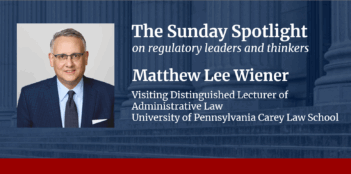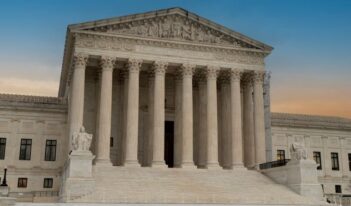
Panel focuses on claims of potential dangers from growth in government agencies.
The Federal Register currently lists over 400 federal departments, agencies, and sub-agencies that finalize thousands of rules each year—a burgeoning administrative state that is a far cry from the U.S. government at the nation’s founding.
According to the contributors to a new book, Liberty’s Nemesis: The Unchecked Expansion of the State, the growth of the federal administrative state in the United States poses a threat to American democracy. Earlier this year, the University of Pennsylvania Law School chapter of the Federalist Society convened a panel of contributors and co-editors from Liberty’s Nemesis to discuss implications of the expanding administrative state.
Underlying most of the discussion among the members of the panel was the claim that, by its very nature, the administrative state is antithetical to the three branches of government created under the U.S. Constitution.
Dean Reuter, General Counsel and Vice President of the Federalist Society and co-editor of Liberty’s Nemesis, argued that concentrating power in administrative agencies was unconstitutional.
“You may have heard the expression ‘judge, jury, and executioner,’” Reuter said. “Administrative agencies are worse. They have even more concentrated powers.”
Reuter explained that, when Congress delegates its legislative authority to agencies to fill in statutory gaps through regulation, agencies are then able to write additional laws, called regulations, that they also then enforce by taking actions before administrative tribunals. In this way, one agency performs governmental functions that are executive, legislative, and judicial, Reuter said.
Cleta Mitchell, a partner in the Washington, D.C. office of Foley & Lardner, discussed what she viewed as the unchecked power of administrative agencies by noting that civil servants in agencies are not elected, which she said makes them largely immune from oversight or accountability.
“The bottom line is that unless Congress resumes its legislative responsibilities under Article 1 of the Constitution, we are not going to be able to rein in this out-of-control and unelected fourth branch of government,” Mitchell said, deeming unchecked agencies “a serious threat to our self-governance.”
To illustrate the potential dangers of an unchecked administrative branch, both Mitchell and fellow panel member, Charles Cooper, founding member and chairman of Cooper & Kirk, PLLC, discussed situations in which they said administrative agencies exceeded their delegated authorities and selectively targeted businesses and organizations based on political considerations.
Cooper spoke about what is known as Operation Choke Point, referring to a series of investigations the U.S. Department of Justice (DOJ) mounted into the practices of payday lenders and other businesses.
As a result of pressure from the DOJ and other agencies like the Federal Deposit Insurance Corporation, banks throughout the country began terminating their financial relationships with payday lenders without any focus on whether specific payday lenders were engaging in fraudulent behavior or other deception, Cooper said.
“Payday lenders are entirely lawful and regulated at the state level,” Cooper stated. “Banks were simply terminating long-term profitable relationships; there was no business explanation for these terminations,” he said.
Cooper concluded that ultimately, banks’ terminations of payday lenders took place due to Operation Choke Point, which he said was “an organized and secret effort on the part of regulatory agencies to target and exterminate certain types of businesses that the Administration disfavored.”
Mitchell also spoke about an apparent pattern by the Internal Revenue Service (IRS) of selectively delaying applications of political organizations applying for tax exempt status that were affiliated with the Tea Party—a conservative grassroots movement that grew out of resistance towards the Affordable Care Act and other initiatives under the Obama Administration.
Mitchell described how, when overseen by certain IRS officials, a process that was supposed to be formal and apolitical apparently became highly subjective and susceptible to manipulation.
Panel members also addressed the future of a U.S. Supreme Court decision known as Chevron v. NRDC, a 1984 case in which the Court established that courts are supposed to defer to administrative agencies’ reasonable interpretation of a statute. John Yoo, the Emanuel S. Heller Professor of Law at the University of California, Berkley and co-editor of Liberty’s Nemesis, spoke about recently confirmed Supreme Court Justice Neil Gorsuch’s opposition to the Chevron doctrine and how overturning this decision could help rein in the expanding administrative state.
“If Justice Gorsuch thinks a congressional delegation is unconstitutional or should be thrown out as a matter of judicial policy, it does not matter if the agencies have expertise,” Yoo said. “The judiciary should have the last word on the meaning of the law.”
Cary Coglianese, the Edward B. Shils Professor of Law at the University of Pennsylvania Law School, director of the Penn Program on Regulation, and faculty advisor to The Regulatory Review, moderated the panel. He asked panel members if they had suggestions for actions the Trump Administration might take to address what the panel members saw as problems of a growing administrative state.
Yoo suggested striving for an administrative state that is more effective and rational, recommending restoration of more active judicial review of agency action. “If agencies know there is a check, they may constrain their behavior,” Yoo said.
Reuter recommended clamping down on agency use of guidance documents, a practice which can allow agencies to establish policy without having to follow standard procedures for the public to have notice about a proposed regulation and provide comments. He identified agency guidance and advisory letters as examples of “sub-regulatory rulemaking” that agencies should avoid.



